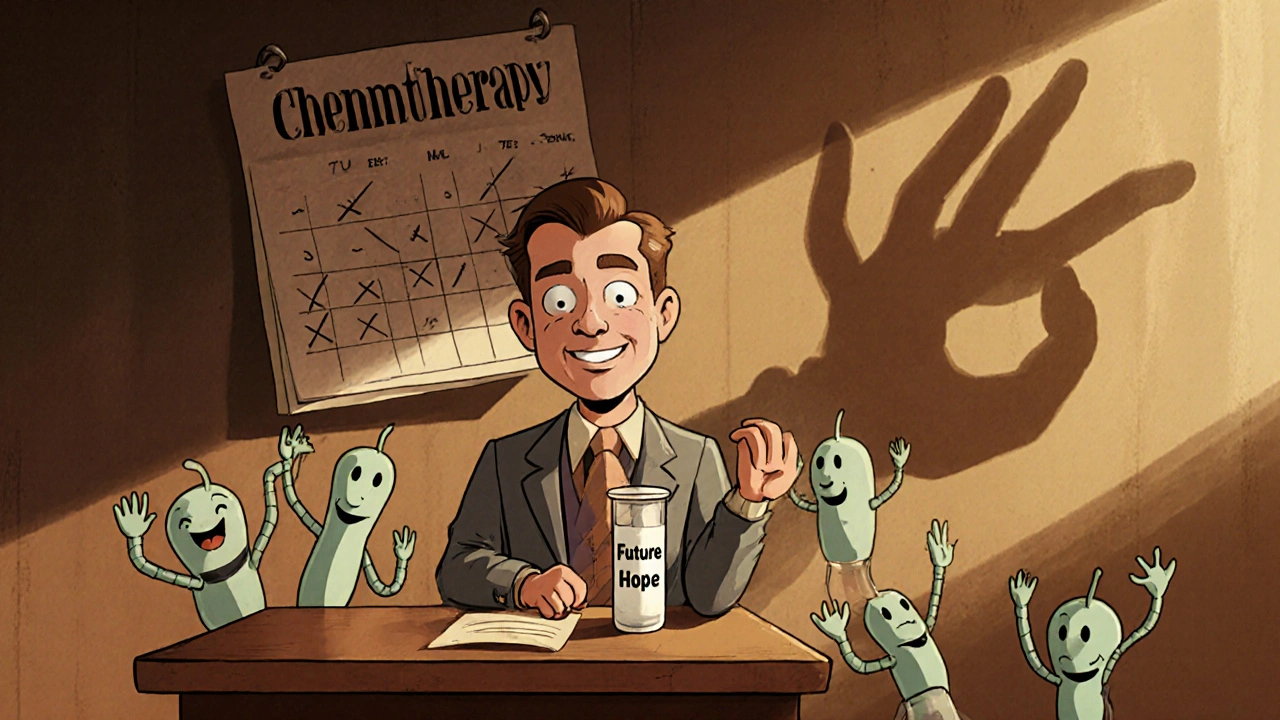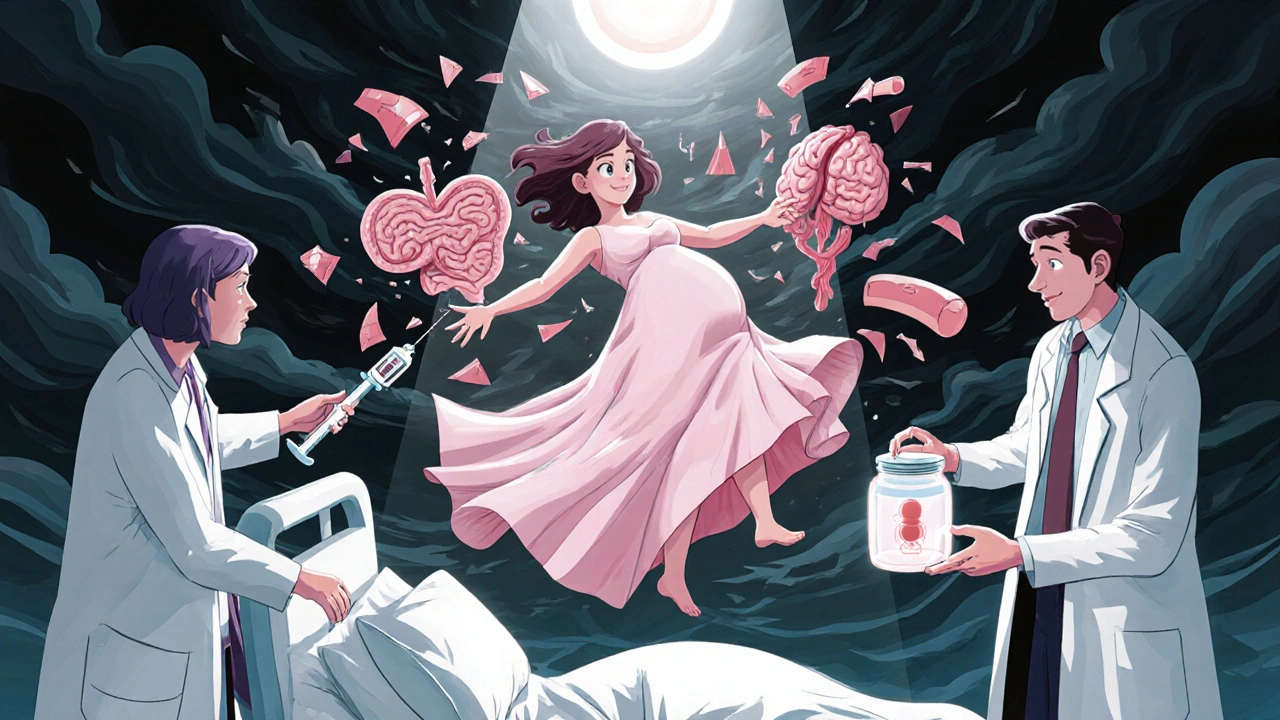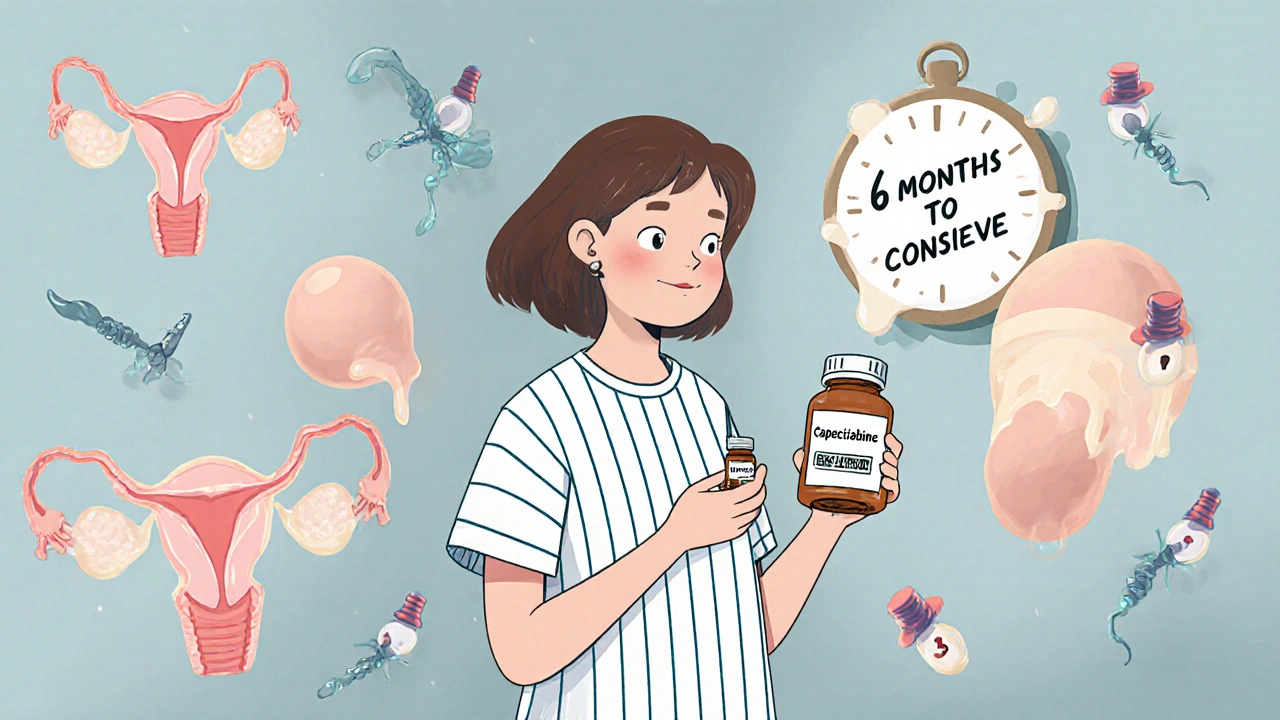When you’re diagnosed with cancer, the focus is on survival. But for many people, especially those in their 20s, 30s, or early 40s, there’s another question hiding beneath the surface: What does this mean for my future as a parent? Capecitabine, a chemotherapy drug used to treat breast, colorectal, and other cancers, is one of those medications that doesn’t always come with clear answers about fertility and pregnancy. It’s not like a simple pill you can stop and start. It’s part of a treatment plan that can change your body in ways you didn’t expect.
What is capecitabine, really?
Capecitabine is an oral chemotherapy drug. It’s a prodrug, meaning your body turns it into another compound-5-fluorouracil (5-FU)-that attacks rapidly dividing cells. That’s why it works against cancer: tumor cells divide fast. But it doesn’t know the difference between a cancer cell and a healthy one, like those in your ovaries, testes, or developing embryo.
It’s commonly prescribed for metastatic breast cancer and stage III colorectal cancer after surgery. People take it as pills, usually twice a day for two weeks, then rest for one week. This cycle repeats. It’s convenient-no IV needed-but that doesn’t make it gentle. Side effects include nausea, hand-foot syndrome, diarrhea, and fatigue. But the biggest concern for people thinking about having kids? Its effect on reproductive health.
Can capecitabine affect fertility in women?
Yes. Capecitabine can damage eggs in the ovaries. Unlike some chemo drugs that cause immediate menopause, capecitabine’s impact is more unpredictable. Some women stop having periods during treatment and get them back after. Others don’t. Age matters a lot here. A 32-year-old woman has a better chance of recovering ovarian function than a 40-year-old. But even young women can lose fertility permanently after just one or two cycles.
A 2023 study in the Journal of Clinical Oncology followed 187 women under 40 who received capecitabine-based regimens for breast cancer. About 42% stopped menstruating during treatment. Of those, only 28% got their periods back within 12 months after finishing. That’s a high risk of early menopause-even if you feel fine otherwise.
There’s no test that can tell you for sure if your eggs are still viable after treatment. Anti-Müllerian hormone (AMH) levels can give a snapshot of ovarian reserve before starting, but they don’t predict recovery. The bottom line: if you want to have biological children later, don’t wait. Talk to a fertility specialist before you start capecitabine.
What about men? Can capecitabine lower sperm count?
It can. Sperm production is sensitive to chemotherapy because the cells that make sperm divide constantly. Capecitabine can reduce sperm count, motility, and even damage DNA inside sperm. That doesn’t always mean infertility-it might mean lower chances of conception or higher risk of miscarriage.
A 2022 study in Human Reproduction tracked 67 men with colorectal cancer treated with capecitabine. Half had normal sperm counts before treatment. After three cycles, only 18% still did. Six months after stopping, 34% had recovered. But recovery wasn’t guaranteed. Some men had no sperm at all after a year.
That’s why sperm banking is strongly recommended before starting treatment. It’s quick, non-invasive, and cheap compared to IVF later. Don’t assume you’ll be fine. Even if you don’t plan to have kids now, your future self might thank you.

Can you get pregnant while taking capecitabine?
Never. Not even once.
Capecitabine is a known teratogen. That means it can cause serious birth defects. Animal studies show it leads to malformed limbs, heart problems, and neural tube defects. Human data is limited because doctors don’t let people get pregnant on it-but there are case reports. One 2021 report in Case Reports in Oncology described a woman who conceived accidentally during her second cycle. Her baby had severe heart defects and multiple organ abnormalities. She terminated the pregnancy.
Even if you’re not getting your period, you can still ovulate. Chemo doesn’t act like a birth control pill. If you’re sexually active and haven’t had a hysterectomy or tubal ligation, you need to use two forms of reliable contraception during treatment and for at least six months after your last dose.
What if you got pregnant while on capecitabine?
This is terrifying to think about, but it happens. If you find out you’re pregnant while on capecitabine, contact your oncologist and a maternal-fetal medicine specialist immediately. Do not stop treatment on your own. Stopping chemo suddenly can be dangerous for you.
There’s no safe time to take it during pregnancy. The first trimester is the most critical for organ development, but damage can happen later too. Your medical team will help you weigh risks: the chance of birth defects versus the risk of cancer spreading. In some cases, treatment is paused or switched to safer drugs. In others, continuing is the only option to save the mother’s life.
There’s no magic answer. But you’re not alone. Specialized clinics have protocols for managing cancer during pregnancy. They’ve helped women deliver healthy babies even while fighting cancer-though those cases are rare with capecitabine.
Can you have a baby after finishing capecitabine?
Maybe. But you need to wait.
Doctors recommend waiting at least six months after your last dose before trying to conceive. Why? Because your body needs time to clear the drug and repair damaged cells. Waiting a year is even better, especially if you’re over 35.
For women: If your periods haven’t returned after six months, get your AMH and FSH levels checked. If ovarian function didn’t come back, you can still become a parent through egg donation, surrogacy, or adoption.
For men: A semen analysis after six months will tell you if sperm count and quality have improved. If not, frozen sperm from before treatment can be used for IVF.
Many people go on to have healthy babies after capecitabine. But you can’t assume it’ll happen. Planning ahead makes all the difference.

What should you do before starting capecitabine?
If you’re thinking about having children in the future-or even just open to the idea-here’s your checklist before you take your first pill:
- Ask your oncologist for a referral to a fertility specialist (reproductive endocrinologist).
- Women: Get an ovarian reserve test (AMH, antral follicle count).
- Men: Freeze sperm. It’s faster than you think-usually one appointment.
- Discuss egg or embryo freezing if you have a partner or are using donor sperm.
- Get on reliable birth control. Two methods are better than one (e.g., IUD + condoms).
- Ask about clinical trials for fertility preservation during chemo.
- Don’t rely on online forums or anecdotal stories. Your case is unique.
This isn’t about being negative. It’s about being prepared. Cancer treatment is hard enough. Adding unplanned infertility or a high-risk pregnancy on top of it is avoidable.
Where can you find support?
You’re not the only one asking these questions. Organizations like Oncofertility Consortium and Livestrong Fertility offer free counseling, financial aid for fertility preservation, and peer support groups. Hospitals with cancer centers often have social workers who specialize in reproductive concerns.
Some insurance plans cover fertility preservation if you’re undergoing chemo. Call your provider and ask: "Does my plan cover egg or sperm freezing for medical reasons?" Don’t assume it doesn’t. Many do now.
And if you’re feeling overwhelmed? That’s normal. Talking to someone who’s been through it helps. Search for "cancer and fertility support groups"-you’ll find people who’ve made it through.
Final thought: Your future self is counting on you
Capecitabine saves lives. But it also reshapes them. The choice to preserve fertility isn’t a luxury. It’s part of your treatment plan. You’re not just fighting cancer-you’re fighting for the life you want after.
Don’t wait until it’s too late. Make the call. Schedule the appointment. Freeze what you can. Even if you end up not using it, knowing you had the option gives you back a piece of control.
Can capecitabine cause permanent infertility?
Yes, it can. In women, it may lead to early menopause by damaging ovarian follicles. In men, it can severely reduce or eliminate sperm production. Age and treatment duration affect the risk. Fertility preservation before starting treatment is the best way to protect future options.
Is it safe to get pregnant after finishing capecitabine?
It’s generally considered safe to try conceiving six months after your last dose, but waiting a year is preferable. This gives your body time to clear the drug and repair any damage to eggs or sperm. Always consult your oncologist and a fertility specialist before trying to get pregnant.
Can I breastfeed while taking capecitabine?
No. Capecitabine passes into breast milk and can harm a nursing baby. You must stop breastfeeding before starting treatment. If you plan to breastfeed in the future, discuss pumping and storing milk before treatment begins, or consider alternatives like formula feeding after recovery.
Does capecitabine affect IVF success rates?
If you froze eggs or embryos before treatment, your chances of IVF success depend on the quality of those samples, not the chemo itself. Capecitabine doesn’t harm stored eggs or sperm. However, if you didn’t preserve fertility, your ovarian reserve may be reduced, lowering natural or IVF success rates.
Are there safer chemotherapy drugs for people who want to have children?
Some chemo drugs are less toxic to fertility than others. For example, certain breast cancer regimens use docetaxel or paclitaxel instead of capecitabine, which may have lower risks. But the choice depends on cancer type, stage, and your overall health. Your oncologist can help weigh effectiveness versus fertility impact.







peter richardson
Just read this and my stomach dropped. I’m 31, diagnosed last month, and they didn’t mention fertility at all until I asked. Why is this not standard info? They treat you like a disease, not a person who might want a kid someday.
Sam Tyler
This is one of those posts that should be mandatory reading for every oncologist before they hand out a chemo script. The fact that so many patients aren’t warned about fertility risks until it’s too late is a systemic failure. Sperm banking takes an hour. Egg freezing takes a couple weeks. Neither is a luxury - it’s part of the treatment plan. If your doctor isn’t bringing this up, ask for a referral to an oncofertility specialist. You’re not being dramatic. You’re being smart.
Shanice Alethia
Ugh. I’m 28 and just finished chemo. They told me ‘maybe you can still have kids’ and I believed them. Turns out I’m in early menopause. Now I’m crying over baby clothes I bought online. Why didn’t anyone tell me the truth? This isn’t just medical advice - it’s emotional warfare. They give you hope like it’s candy and then take it away when you’re already broken.
Cosmas Opurum
They want you to freeze your DNA but won’t pay for it? Typical. In Nigeria, we don’t even have clinics that do this. Meanwhile, Americans are banking sperm like it’s a TikTok trend while people in the Global South die because they can’t even get basic chemo. This whole ‘fertility preservation’ thing is just another way rich folks buy their future while the rest of us pray for survival.
KC Liu
Let’s be real - this whole fertility thing is a distraction. Cancer kills. You want kids? Have them before you get diagnosed. Don’t turn a life-saving treatment into a Pinterest board about baby names. They didn’t promise you a future. They promised you a chance to live. Stop treating your ovaries like a bank account.
Kirk Elifson
Anyone else notice how every single study cited here is from the US? What about global data? I’ve seen African women get chemo and still have babies. Maybe the real issue isn’t the drug - it’s how we medicalize everything. You don’t need a 12-page guide. You need a doctor who cares. Also, why is no one talking about how birth control pills are illegal in some countries but chemo isn’t? Double standard much?
shridhar shanbhag
I’m from India, 35, on capecitabine now. My wife and I froze 3 embryos before starting. Cost was half of what it is in the US. We didn’t have insurance coverage, but we saved for it. It’s not about money - it’s about priority. If you’re alive in 5 years but can’t have a child, what did you fight for? My oncologist didn’t mention it. I asked. That’s the difference.
Dylan Kane
Wow. So many people are acting like this is a surprise. Of course chemo messes with fertility. It kills cells. It’s not magic. You want kids? Don’t get cancer. Simple. But hey, at least now you’ve got a 2000-word essay to cry over while you wait for your next infusion.